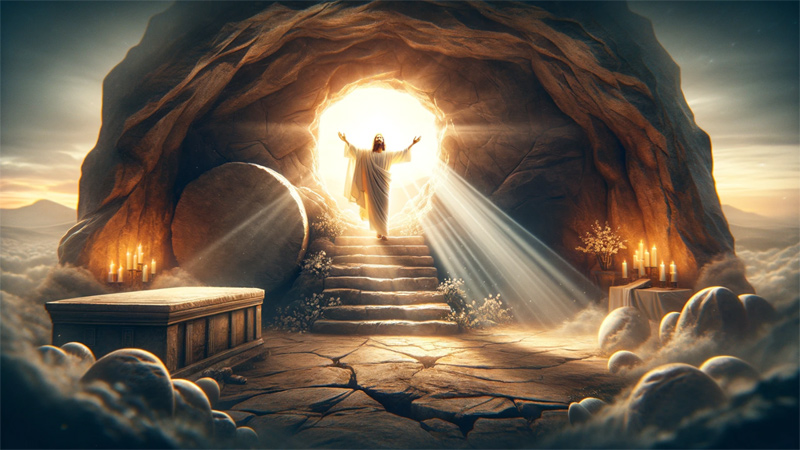The Resurrection of Jesus Christ is a cornerstone of Christian faith, symbolizing the triumph of Jesus over death and his promise of eternal life for believers. This event is not just a biblical story; it's the foundation upon which Christianity is built. The resurrection took place three days after Jesus was crucified and buried, marking the culmination of what Christians observe as Holy Week, which includes Palm Sunday, Maundy Thursday, Good Friday, and finally, Easter Sunday, the day of Jesus' resurrection.
According to the New Testament of the Bible, Jesus Christ was arrested, tried, and then crucified by the Romans on what is now known as Good Friday. His body was placed in a tomb, which was then sealed with a large stone. Guards were posted to prevent his disciples from taking the body. However, on the third day, which is celebrated as Easter Sunday, Jesus rose from the dead. The Gospels of Matthew, Mark, Luke, and John, each offer an account of the resurrection, providing details of how the tomb was found empty by a group of women followers of Jesus, how angels declared to them that Jesus had risen, and how Jesus appeared to his disciples after his resurrection.
The Significance of the Resurrection
The Resurrection of Jesus Christ holds profound significance in Christian theology. It is seen as the validation of Jesus' divinity and the fulfillment of the prophecies stated in the Old Testament. The resurrection is also viewed as a testament to the power of God and a promise of life after death for all who believe in Jesus. For Christians, the resurrection is a source of hope, demonstrating that death is not the end but the beginning of eternal life with God.
Moreover, the resurrection is central to Christian salvation. According to Christian belief, Jesus' death and resurrection provided atonement for humanity's sins, offering all people the possibility of forgiveness and reconciliation with God. This act of love and sacrifice is the heart of the gospel message and the reason for Easter celebrations around the world.
Easter Celebrations
Easter, the day commemorating the Resurrection of Jesus Christ, is the most important and joyous occasion in Christianity. It is celebrated with various customs and traditions around the world. In many churches, Easter is preceded by Lent, a 40-day period of fasting, prayer, and penance, culminating in Holy Week, which re-enacts the events leading up to the resurrection. Easter Sunday itself is marked by special church services that are filled with joyful music, the ringing of church bells, and the proclamation of the resurrection.
Many Easter traditions are symbolic of new life and resurrection. For instance, the Easter egg is seen as a symbol of the empty tomb from which Jesus emerged. Easter parades, egg hunting, and the giving of Easter eggs are popular customs associated with the holiday, celebrated by Christians and many people in secular contexts as well. These celebrations reflect the joy and renewal that the resurrection represents.
The Witnesses of the Resurrection
The New Testament provides several accounts of Jesus appearing to his disciples and others after his resurrection. These appearances are crucial, as they serve as the primary evidence for the resurrection's historical reality. Jesus is reported to have appeared to Mary Magdalene, the women at the tomb, his disciples, and over five hundred others at different times and places. These encounters are not only significant for their role in proving the resurrection but also for the teachings and commissions Jesus imparted during them, including the Great Commission, where Jesus instructed his followers to spread his teachings to all the nations of the world.
These post-resurrection appearances were transformative for Jesus' followers, turning despair and doubt into faith and mission. The disciples, who were once fearful and uncertain, became bold proclaimers of Jesus' resurrection, willing to face persecution and even death for their belief. This dramatic change is seen as further evidence of the resurrection's impact and truth.
The Historical and Theological Impact
The Resurrection of Jesus Christ has had a profound impact on history and theology. It has shaped Christian doctrine, worship, and practice for centuries. The resurrection is celebrated as evidence of God's love and justice, demonstrating His power to overcome sin and death. It also has profound implications for Christian ethics and the way believers live their lives, emphasizing values such as hope, love, and forgiveness.
Theologically, the resurrection has been the subject of much reflection and debate. It is considered a mystery of faith, beyond full human understanding, yet it is also the foundation of Christian hope, affirming that God's love is stronger than death. Through the centuries, theologians have explored the meaning and implications of the resurrection, contributing to a rich tradition of Christian thought and spirituality.
In conclusion, the Resurrection of Jesus Christ is at the heart of Christian faith, embodying the hope of eternal life and the promise of God's redemption. It is celebrated with joy and reverence by Christians worldwide, not only as a historical event but as a current reality that offers peace, hope, and direction in life. The resurrection assures believers of Jesus' victory over death and his presence in their lives today, guiding and sustaining them in their spiritual journey.

